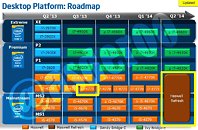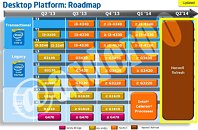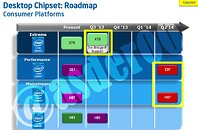Thursday, June 13th 2013

Intel's Desktop Processor Roadmap for H2 2013 to H1 2014 Revealed
According to CPU World staff, who, by appealing to an unnamed secondary source, managed to confirm the validity of an earlier leak, we are now looking at Intel's desktop roadmap for the following twelve months. The slides reveal the Q3 launch of Intel's Ivy Bridge-E chips, the Core i7-4820K, i7-4930K and i7-4960X comprising the lineup. The new Extreme chips will make use of the existing X79 platform. Also in Q3 the Premium line will receive a new product, the Core i7-4771, which we do not know in what way differs from the currently available Core i7-4770, but a judicious appeal to wild speculation could point out an upgraded IGP.
The mid segments will get a platform upgrade in the form of a new H81 chipset, and six new processors, the Core i3-4130, i3-4330, i3-4340, as well as three new Ivy Bridge based Pentium chips, the G3220, G3420 and G3430. Celeron processors are in the pipelines for Q1 2014, while Q2 will follow with the Haswell refresh and the accompanying new platform based on the Z97 and H97 chipsets.
Source:
CPU World
The mid segments will get a platform upgrade in the form of a new H81 chipset, and six new processors, the Core i3-4130, i3-4330, i3-4340, as well as three new Ivy Bridge based Pentium chips, the G3220, G3420 and G3430. Celeron processors are in the pipelines for Q1 2014, while Q2 will follow with the Haswell refresh and the accompanying new platform based on the Z97 and H97 chipsets.



21 Comments on Intel's Desktop Processor Roadmap for H2 2013 to H1 2014 Revealed
I've also heard rumors of a 2.8Ghz Base 30 Mb LVL 3 Cache 10 core Xeon.
Hopefully we will see this year if something happens in this direction!
-soldered top
-less heat with high voltage
-more OC potential (as many of 4770 seem like they cant clock too high), meaning to eliminate this "luck of the draw" for a capable chip when buying a cpu.
I am soooooooooo very happy for Intel. They release an Ivy Bridge refresh of the enthusiast chips a minimum of one quarter after they introduced the next generation of their mainstream processors.
Let me guess Intel, we will be graced with performance that just barely beats out mainstream (read: significantly cheaper) processors in highly threaded applications. We'll have the honor of getting chips that overheat because you decided to cheap out on production, unless someone over there finally figured which end of the crap stick to swing and which end to hold. On top of this, the PCH will still deliver connectivity only equaling that of mainstream options (read: not all SATA III, and only 6 ports maximum). We the consumer get all of this, and get to pay through the nose for it.
I'm angry that I spent the money on X79. I'm angrier that Intel is telling its high-end consumers that they don't get access to new tech. Sorry, I'd like to be happy to see IB-e, but nearly two years between SB-e and IB-e (not to mention the lackluster X79 PCH) has made me a more jaded person.
Edit:
OK, here's what will get me excited about IB-e. The 4930k will come in at MSRP $450. The PCH will be upgraded to a 45nm process; this upgrade will provide 10 SATA III ports, cooler temperatures, and more USB 3 slots natively. PCI connectivity will be dropped completely, and the CPU will get access to nearly all 40 pci-e lanes for expansion cards.
Knowing Intel, the price and PCH upgrades are out the window. I'm not looking forward to the way Intel is going, and hopefully Intel will right their problems next generation. I'm not holding my breath though.
but lower volts for 5ghz would been sweet
Even if they do update the PCH, I don't see how the overall performance will be worth it.... and really they are just catching up to the features on mainstream boards...unless the CPU and IPC improvements are huge, but I don't think its going to be worth it.
I think I'd rather move to haswell but Im gonna wait and see.
Also you make it sound like the 3770k and 4770k walk over SB-E and generally speaking, the performance isn't all that much higher. When it comes to raw CPU power, you might want to think again.
If you look at Guru3d's 4770k review and on every graph look for the 3820. You'll see that the 4770k and 3770k run faster than it (in most cases,) but in general, it's not a huge increase. So the only thing I think is half-baked is your analysis of X79 because it does everything that it should and being an owner of a skt2011 machine, I can tell you that your concerns are unfounded. I would not give up skt2011 for skt1150.
I will also wrap up by saying that z87 has the same limitations as X79 in the sense that they both use DMI 2.0. They both have the same amount of bandwidth to the CPU from the PCH.
At least 8x SATA3 ports native
at least 6x USB3 native
6 core CPUs mainstream
At least a 50% performance improvement over my 3570k
Far more PCI-E lanes for mainstream chipsets
For the love of god, KILL PCI slots on enthusiast boards.